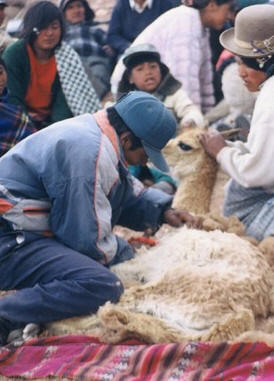|
Community management of vicuña in the
wild
Nadine Renaudeau d'Arc
In
the past two decades, a wide array of integrated conservation and development
theories have been challenged and criticised, both for their apparent failure in
achieving and maintaining conservation and development aims. The criticisms are
voiced by both biological and social scientists.
The
thesis builds on current criticisms and debates and uses the vicuña as a case
study to critically examine if the assumptions that validate current theory are
being proved on the ground: (1) Is the rhetoric of partnership reflected in
reality?; (2) Do communities function in the way they are assumed to? and (3)
are benefits and incentives for conservation and development in place? These
findings should add up to answer the main question of this thesis: Is integrated
conservation and development of vicuna under common property management
possible? The approach to answering these questions is based on a gradual
process of enquiry from macro-to-micro level.
Bolivia provides an unique contextual setting to examine these questions because
vicuna conservation under common property management. During the period of this
study 1997-2002, generation of benefits (if any) are other than economic ones
since the country has not commercialised fibre yet and vicuna management occurs
under a political and social context of decentralisation (e.g. moving
responsibilities to a lower level of government) with local communities
recognised by the State as exclusive beneficiaries from use.
Outputs:
Procedural Paper
Field report to UEA
Lamas, H
and R. Renaudeau d’Arc “Proceso de integracion binacional en el manejo de
camelidos sudamericanos”. Memoria III, Congreso Mundial sobre camelidos, Potosi,
Bolivia. Tomo II : 887-892.(PDF)
Renaudeau
d’Arc, N and G. Lichtenstein (2003), “Impacto del manejo de la vicuna en
Bolivia y Argentina sobre la conservacion de la vicuna y el desarollo local”
Memoria III, Congreso Mundial sobre camelidos, Potosi, Bolivia. Tomo II : 903 –
908.(PDF)
|
 |
The thesis is being supervised by Dr Kate
Brown and Dr Edward Allison at the School of Development Studies, University of
East Anglia. UK.
 
Observing a vicuña capture in Bolivia

Community managment of vicuñas in Bolivia
|

